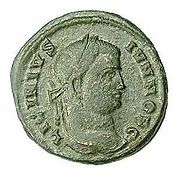
Licinius II
Encyclopedia

Licinius
Licinius I , was Roman Emperor from 308 to 324. Co-author of the Edict of Milan that granted official toleration to Christians in the Roman Empire, for the majority of his reign he was the rival of Constantine I...
. He nominally served as Caesar in the eastern empire from 317 to 324 AD while his father was Augustus. His mother was Licinius' wife Flavia Julia Constantia
Flavia Julia Constantia
Flavia Julia Constantia was the daughter of the Roman Emperor Constantius Chlorus and his second wife, Flavia Maximiana Theodora....
, who was also the half-sister of Constantine I
Constantine I
Constantine the Great , also known as Constantine I or Saint Constantine, was Roman Emperor from 306 to 337. Well known for being the first Roman emperor to convert to Christianity, Constantine and co-Emperor Licinius issued the Edict of Milan in 313, which proclaimed religious tolerance of all...
.
After his defeat by Constantine at the Battle of Chrysopolis
Battle of Chrysopolis
The Battle of Chrysopolis was fought on 18 September 324 at Chrysopolis , near Chalcedon , between the two Roman emperors Constantine I and Licinius. The battle was the final encounter between the two emperors. After his navy's defeat in the Battle of the Hellespont, Licinius withdrew his forces...
, Licinius the elder was initially spared and placed in captivity at Thessalonica. However, within a year Constantine seems to have regretted his leniency and the former Emperor was hanged.
The younger Licinius, who was Constantine's nephew, also fell victim to the emperor's suspicions and was killed, probably in the context of the execution of Crispus
Crispus
Flavius Julius Crispus , also known as Flavius Claudius Crispus and Flavius Valerius Crispus, was a Caesar of the Roman Empire. He was the first-born son of Constantine I and Minervina.-Birth:...
in 326.
Other reports relate that Licinius the younger was forced into slavery in the imperial textile factories in Africa, where he is noted in 336. However, the imperial rescript of 336 makes it clear that the "son of Licinianus" referred to was not Licinius II as it directs that he be reduced to the slave status of his birth. No son of Constantine's sister would have been referred to in this manner.
Sources
- Grant, Michael (1993), The Emperor Constantine, London. ISBN 0-75380-5286
- Dietmar Kienast: Römische Kaisertabelle. Grundzüge einer römischen Kaiserchronologie. Wiss. Buchgesellschaft, 3. Auflage, Darmstadt 2004 (unveränderter Nachdruck der 2., durchgesehenen und erw. Auflage 1996), S. 296, ISBN 3-534-18240-5.
- Hans A. Pohlsander, The Emperor Constantine. New York/London: Routledge, 1996. ISBN 0-415-13178-2

